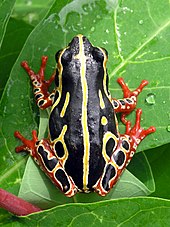Common reed frog
| Common reed frog | |
|---|---|

| |
| Scientific classification | |
| Domain: | Eukaryota |
| Kingdom: | Animalia |
| Phylum: | Chordata |
| Class: | Amphibia |
| Order: | Anura |
| Family: | Hyperoliidae |
| Genus: | Hyperolius |
| Species: | H. viridiflavus
|
| Binomial name | |
| Hyperolius viridiflavus Dumeril & Bibron, 1841
| |

The common reed frog (Hyperolius viridiflavus) is a species of tree frogs in the family Hyperoliidae found in Burundi, the Democratic Republic of the Congo, Ethiopia, Kenya, Rwanda, Sudan, Tanzania, and Uganda, and possibly the Central African Republic, Chad, and Eritrea. Its natural habitats are subtropical or tropical dry forest, subtropical or tropical moist lowland forest, subtropical or tropical moist montane forest, dry savanna, moist savanna, subtropical or tropical dry shrubland, subtropical or tropical moist shrubland, subtropical or tropical seasonally wet or flooded lowland grassland, subtropical or tropical high-altitude grassland, rivers, swamps, freshwater lakes, intermittent freshwater lakes, freshwater marshes, intermittent freshwater marshes, freshwater springs, arable land, pastureland, rural gardens, urban areas, heavily degraded former forests, water storage areas, ponds, irrigated land, seasonally flooded agricultural land, and canals and ditches.
Some evidence suggests that west African frogs may change sex from female to male after having successfully bred.[2] Animals that switch sex as adults are known as sequential hermaphrodites because they have the gonads of either sex but at different periods of their lives. This contrasts with animals which are "simultaneous hermaphrodites" which have both gonads at the same point. However, this sequential hermaphrodotism in reed frogs has only been noted once and in a captive colony; it is not generally accepted by scientists that this process occurs in amphibians. The film Jurassic Park[3] is the cultural reason many believe that frogs can be sequential hermaphrodites.
References
- ^ Schiøtz, A., Channing, A., Poynton, J.C. & Largen, M. 2004. Hyperolius viridiflavus. 2006 IUCN Red List of Threatened Species. Archived June 27, 2014, at the Wayback Machine Downloaded on 22 July 2007.
- ^ Grafe, T. U.; K. E. Linsenmair (1989). "Protogynous sex change in the reed frog: Hyrperolius viridiflavus" (PDF). Copeia. 1989 (4): 1024–1029. doi:10.2307/1445989. JSTOR 1445989.
- ^ Jurassic Park, 2019-02-08|work=Wikipedia|language=en|access-date=2019-02-12}}

